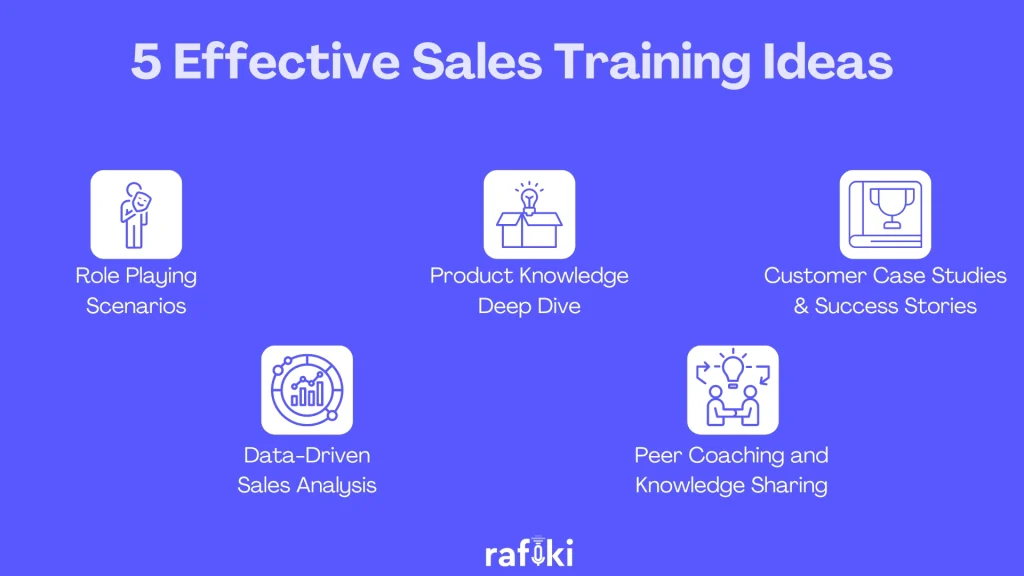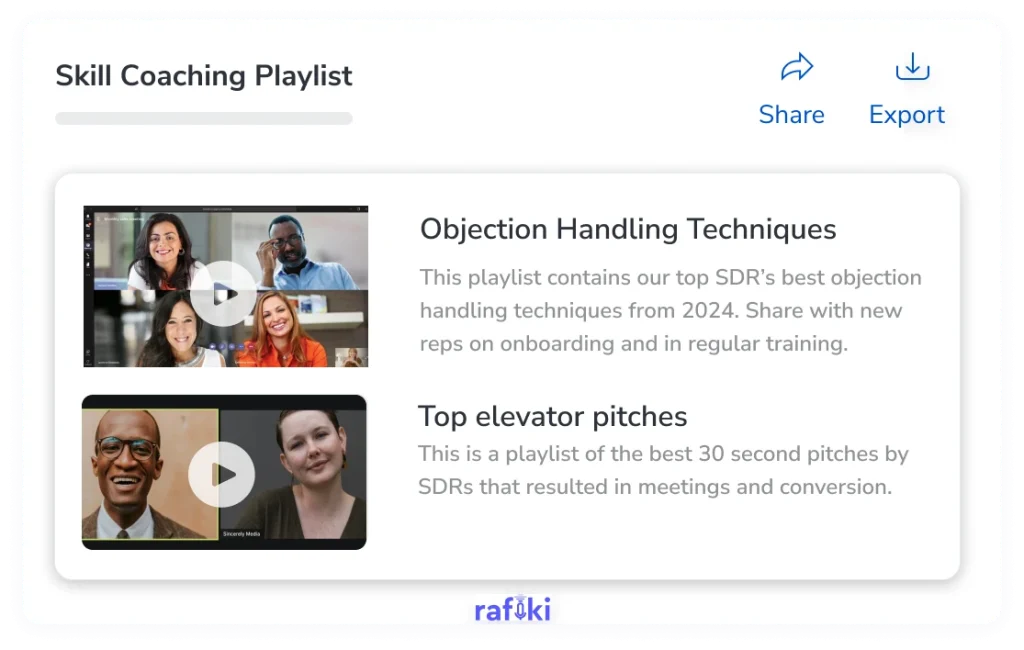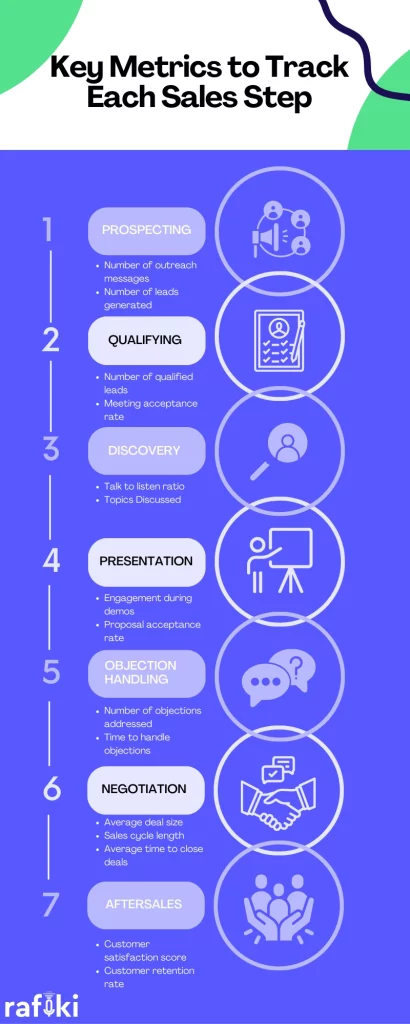Why Rafiki
Pricing


Pricing
Solutions

RevOps Leaders
Synchronize revenue generating functions

SDR Leaders
Get your team aligned and Coach your Reps 3x faster at scale

Sales Leaders
Unlock pipeline truth, drive confident forecasts

In the high-octane world of sales, staying ahead of the curve is crucial. Regular sales training is the key to equipping your team with the knowledge, skills, and confidence to dominate.
It's the difference between chasing leads and confidently guiding them through the sales funnel, consistently exceeding targets. But with so many sales training programs and software options available, how do you craft impactful training sessions that truly boost performance?
We've got you covered.
Here, we'll dive into 5 proven sales training ideas you can implement right away, designed to energize your team and propel them towards achieving their full potential.

Imagine this: a prospect throws a curveball objection your rep’s way. How should they respond? Role-playing is one of the best sales training tactics. It injects real-world scenarios into your sessions, allowing your team to practice handling common objections, navigating challenging customer conversations, and refining their communication skills in a safe, controlled environment.
Here's how to implement it:
In the fast-paced world of sales, a deep understanding of your product is your ultimate weapon. Customers are savvy and expect reps to be walking encyclopedias of their offerings. Here's a training session dedicated to solidifying product knowledge:
Sharing the triumphs of your top performers isn't just bragging – it's a powerful training tool. Customer case studies showcase real-world sales wins, offering your team invaluable insights into successful strategies.
Here's how to leverage them:
By incorporating customer success stories into your training, you provide your team with concrete examples of what works, fostering a culture of continuous learning and improvement.
Additionally, consider using a platform like Rafiki to create a playlist of those exact triumphant moments in the call when your rep sealed the deal or overcame a difficult objection. This ensures your team has a readily available library of success stories for future reference and inspiration.

Numbers don't lie. Analyzing sales data is a goldmine of insights that can inform your training and propel your team's performance.
Here's how to translate data into actionable training:
By incorporating data-driven insights into your sales training, you ensure your sessions are laser-focused on the areas that will have the most significant impact on overall team performance.
Rafiki's Smart Call Scoring can further streamline this process by automatically analyzing call data and providing objective performance evaluations, saving you and your team valuable time and resources.
Sales is a team sport, and fostering a culture of collaboration can significantly boost performance. Peer coaching sessions allow reps to learn from each other's strengths and experiences, creating a powerful knowledge-sharing network.
Here's how to implement it:
Here's a bonus idea: Sandler Sales Training is a tried and true method for improving your team's performance. It has been around for decades and the results don't lie. Learn more about it here.
Sales is like a fast-moving river; to stay afloat, you need to constantly adapt and refine your skills. Regular sales training is your life jacket, ensuring your team has the knowledge and agility to navigate the ever-changing currents. But how often should you conduct these training sessions?
There's no one-size-fits-all answer, as it depends on your team's specific needs and the dynamics of your industry. However, a good rule of thumb is to prioritize training at least monthly. This allows for consistent skill development and keeps your team sharp.
Consider incorporating quarterly or even bi-annual sessions for in-depth focus areas, allowing for deeper dives into specific topics. Keep in mind, consistent sales training isn't a luxury; it's an investment in your team's success, and ultimately, your company's bottom line.
Additionally, there are several sales training programs out there such as by HubSpot and by Sales Insights Lab. If you think your reps are better suited as self learners, you can also opt for sales training courses. These can be online sales training such as from Udemy or Coursera or offline. Make sure you sponsor these learning opportunities, expecting reps to spend their own dime on courses may not work out!

So, you've implemented these engaging offline and online sales training ideas – now, how do you measure their impact? Measuring the effectiveness of your training isn't just about checking a box; it's about ensuring your efforts are translating into real results for your team and your bottom line.
Here are key metrics to keep an eye on:
The critical factor here is data-driven insights. Consider using a tool like Rafiki to analyze sales call recordings and identify areas where the implemented training techniques are being applied effectively. This data can further inform future training sessions and ensure continuous improvement.
By consistently monitoring these metrics and adapting your sales training programs based on the results, you can ensure your sales team is equipped with the knowledge, skills, and confidence to consistently achieve peak performance.
Investing in regular sales training is a cornerstone of building a high-performing salesforce. By implementing the ideas outlined above and tailoring them to your specific team's needs, you can equip your reps with the knowledge, skills, and confidence to consistently exceed expectations and drive sustainable sales success.
Ready to explore how Rafiki can help you implement these effective sales training strategies? Sign up for a free 14-day trial today and experience the power of conversation and revenue intelligence in action!
Train Your Sales Team Effectively